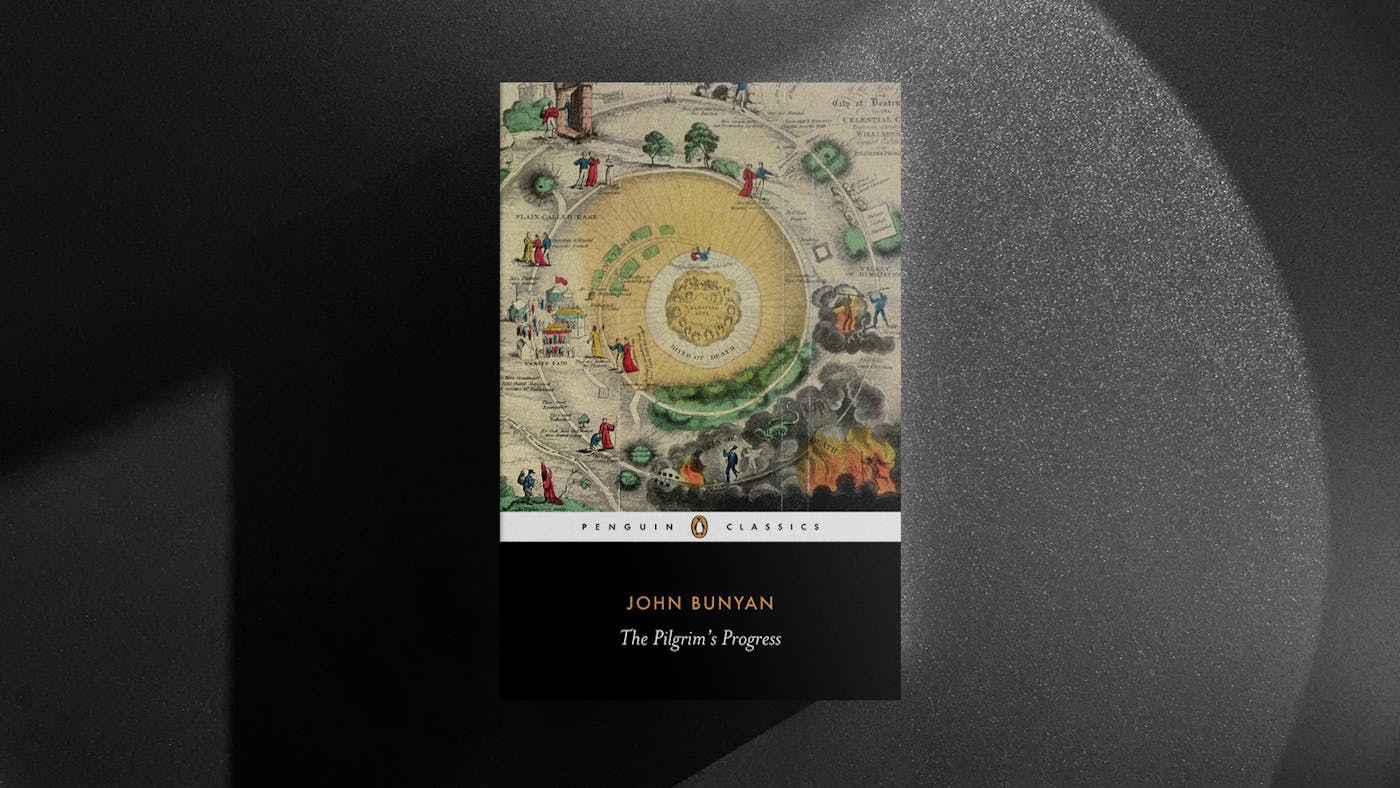The Pilgrim’s Progress
A Reader’s Guide to a Christian Classic

Like J.R.R. Tolkien’s Lord of the Rings trilogy, John Bunyan’s Pilgrim’s Progress is a road trip. It recounts the journey that Christian makes from the City of Destruction to the Celestial City, along with the many encounters he has along the way. Technically, Pilgrim’s Progress comes in two parts, the second part narrating the same journey that Christian’s wife, Christiana, and her four boys make. In some notable ways, the second part offers a more balanced portrayal of the Christian journey to heaven.
Almost everyone is acquainted with Pilgrim’s Progress in some way or another because many of the characters — Worldly Wiseman, Pliable, Obstinate, Formalist, Talkative, Giant Despair — and locations — the wilderness of this world, Vanity Fair, By-Path-Meadow, Slough of Despond, Doubting Castle, Delectable Mountains — are used in everyday conversation.
Many, like C.H. Spurgeon, may boast of having read Pilgrim’s Progress many times, but what might a first-time reader expect?
Bible in Every Line
First, Pilgrim’s Progress reveals Bunyan’s belief in the absolute authority of Scripture. Nearly every line reflects a Bible verse or passage. It was Spurgeon who said that if you pricked Bunyan, his blood would be “Bibline.”
A section from the second part displays Bunyan’s esteem for Scripture, as Prudence catechizes young Matthew:
Pru. What do you think of the Bible?
Mat. It is the Holy Word of God.
Pru. Is there nothing written there but what you understand?
Mat. Yes, a great deal.
Pru. What do you do when you meet with such places therein that you do not understand?
Mat. I think God is wiser than I. I pray also that he will please to let me know all therein that he knows will be for my good. (Pilgrim’s Progress, 228)
Losing Our Burden
Second, Pilgrim’s Progress includes a strong emphasis on conversion. A long time passes before Christian’s great burden of sin is removed, rolling down the hill and into the tomb. Why does it take Christian so long? Why the prolonged, effortful struggle with sin before finding relief and assurance? Was Bunyan attempting to suggest that this is how all conversions take place? Was he deliberately attacking a form of easy-believism, suggesting that would-be Christians needed to pass through an agonizing struggle before conversion? Bunyan was accused of such after the first edition of Pilgrim’s Progress was published in 1678.
Far from attempting some form of “preparationism” (as some view it today), however, Bunyan was telling his own story. He wrestled with the guilt of sin for several years before he came to assurance. And perhaps it is best to understand what happened when the burden fell from Christian’s shoulders as the moment when Christian was given assurance rather than the moment of his actual conversion. (It is interesting to note, in passing, that in part 2, the conversions of Christiana and the four boys are far less stressful.)
Justification for the Ungodly
Third, Pilgrim’s Progress reveals a firm grasp of substitutionary atonement. At one point, Hopeful (who lived in Vanity Fair but joins Christian following the death of Faithful in the city) is interrogated by Faithful and Christian as to his conversion. Before his death, Faithful tells Hopeful, “Unless I could obtain the Righteousness of a man that never had sinned, neither mine own, nor all the Righteousness of the World could save me.” To which Christian asks, “And did you ask him what man this was, and how you must be justified by him?” This is Hopeful’s answer:
Yes, and he told me it was the Lord Jesus Christ, that dwelleth on the right hand of the Most High. And thus, said he, you must be justified by him, even by trusting to what he hath done by himself in the days of his Flesh, and suffered when he did hang on the Tree. I asked him further, how that man’s Righteousness could be of that Efficacy, to justify another before God? And he told me, he was the mighty God, and did what he did; and died the Death also, not for himself but for me; to whom his doings, and the worthiness of them should be Imputed if I believed on him. (143)
The story goes on to relate how difficult it was for Hopeful to believe, and how he eventually prayed a “sinner’s prayer”:
God be merciful to me a sinner, and make me to know and believe in Jesus Christ; for I see, if his Righteousness had not been, or I have not faith in that Righteousness, I am utterly cast away: Lord, I have heard that thou art a merciful God and hast ordained that thy Son Jesus Christ should be the Saviour of the world. And moreover, thou art willing to bestow him upon such a poor sinner as I am (and I am a sinner indeed); Lord, take therefore this opportunity, and magnify thy Grace in the salvation of my soul, through thy Son Jesus Christ, Amen. (144)
Hopeful says he prayed this prayer “an hundred times twice told,” until at last, the Father showed him his Son.
I did not see him with my Bodily eyes, but with the eyes of my understanding; and thus it was. One day I was very sad, I think sadder than at any time in my life; and this sadness was through a fresh sight of the greatness and vileness of my Sins. And as I was then looking for nothing but hell, and the everlasting damnation of my Soul, suddenly, as I thought, I saw the Lord Jesus looking down from Heaven upon me, and saying, Believe on the Lord Jesus Christ, and thou shalt be saved. (145)
We could go on, but this excerpt is sufficient to show the evangelical nature of Bunyan’s doctrine of conversion.
‘He Who Suffers, Conquers’
Fourth, Pilgrim’s Progress places the difficulty of the Christian life center stage. Bunyan knew all about trials. He could recall with the apostle Paul, “Through many tribulations we must enter the kingdom of God” (Acts 14:22). Along with a contemporary Puritan preacher, John Geere, Bunyan could have adopted as his life motto vincit qui patitur — “he who suffers, conquers.”
Bunyan was arrested and imprisoned in 1660 for preaching illegally. He would spend the next twelve years in a prison cell in Bedford, England, and three years following his release, he would be imprisoned again for six months. Pilgrim’s Progress was begun in a prison cell and completed during his second imprisonment. During these years, he suffered bouts of deep anxiety, which one contemporary psychiatrist has labeled “obsessional disorders.”
“No one can read ‘Pilgrim’s Progress’ without learning how difficult the Christian life can become.”
No one can read Pilgrim’s Progress without learning how difficult the Christian life can become. The near-suicidal few days that Christian and Faithful spend in the dungeons of Doubting Castle at the hands of Giant Despair and his equally morose wife, and the later battle scene with Apollyon, are some of the most graphic descriptions of trial and tribulation in all literature. And then there is Vanity Fair, where Beelzebub is in charge. It is here that Faithful is martyred.
To prepare Christian for the arduousness of the journey, he is initially taken to the House of Interpreter, where he is shown, among other sights, valiant men armed with swords and protected by a helmet, “cutting and hacking most fiercely” (36). All this reminds us of the portrayal of the Christian soldier in Ephesians 6.
Final River
Fifth, in true Puritan style, Pilgrim’s Progress not only prepares us to live the Christian life; it also prepares us to die the Christian’s death. The account of Hopeful and Christian crossing the river that leads to the Celestial City is among the most moving in the allegory. Surprisingly, Christian is filled with doubts at the last, and several times he sinks beneath the water, only to be rescued by his friend. Hopeful tells Christian,
These troubles and distresses that you go through in these Waters, are no sign that God hath forsaken you; but are sent to try you, whether you will call to mind that which heretofore you have received of his goodness, and live upon him in your distresses.
And Christian responds,
Oh I see him again; and he tells me, When thou passest through the waters, I will be with thee; and through the Rivers, they shall not overflow thee. (159)
“‘Pilgrim’s Progress’ not only prepares us to live the Christian life; it also prepares us to die the Christian’s death.”
It has been said of eighteenth-century Methodists that they died well. Bunyan, with his pastoral heart, allowed Christian to waver a little at the end in order that his Christian readers might be given sufficient grace should they, too, waver when their time comes.
The very final paragraph in part 1 is among the most shocking that I have read. When I first read Pilgrim’s Progress, in my teens, I was not prepared for what Bunyan wrote, and I recall crying out loud, “No way!” To recount it here would require a spoiler alert, and my advice to you, if you’re reading it for the first time, is not to be tempted to read the last paragraph until you have read the whole book.




